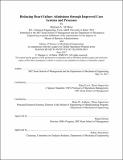| dc.contributor.advisor | Retsef Levi and Brian W. Anthony. | en_US |
| dc.contributor.author | Al-Meer, Mariam A | en_US |
| dc.contributor.other | Leaders for Global Operations Program. | en_US |
| dc.date.accessioned | 2017-10-18T14:43:05Z | |
| dc.date.available | 2017-10-18T14:43:05Z | |
| dc.date.copyright | 2017 | en_US |
| dc.date.issued | 2017 | en_US |
| dc.identifier.uri | http://hdl.handle.net/1721.1/111872 | |
| dc.description | Thesis: S.M., Massachusetts Institute of Technology, Department of Mechanical Engineering, in conjunction with the Leaders for Global Operations Program at MIT, 2017. | en_US |
| dc.description | Thesis: M.B.A., Massachusetts Institute of Technology, Sloan School of Management, in conjunction with the Leaders for Global Operations Program at MIT, 2017. | en_US |
| dc.description | This electronic version was submitted by the student author. The certified thesis is available in the Institute Archives and Special Collections. | en_US |
| dc.description | Cataloged from student-submitted PDF version of thesis. | en_US |
| dc.description | Includes bibliographical references (pages 121-124). | en_US |
| dc.description.abstract | Heart failure (HF) is a complex chronic condition that can result from any cardiac disorder that impairs the ventricle's ability to fill with or eject blood. The American Heart Association predicts that there will be about 10 million HF patients in the US by 2037, with total hospitalization costs exceeding $70 billion. This represents a considerable burden to hospitals nationwide, including the Massachusetts General Hospital (MGH) -- a leading medical center that has long grappled with patient overcrowding and capacity constraints. This thesis presents an extensive mapping of the HF care pathway at MGH, followed by the results of a detailed retrospective analysis of the general behavior of HF patients admitted to MGH. Here, we notice that the majority of HF admissions originate as self-referrals via the Emergency Department (ED) and take place on weekdays, between the hours of 9am and 6pm. Moreover, we find that about 57% of hospitalized HF patients often have no scheduled follow-up appointments with their providers in the two weeks leading up to their admissions and, similarly, about 43% have no scheduled appointments in the eight weeks post hospital discharge. These represent two critical time periods in the events of acute heart failure decompensation. In an effort to prioritize targeted outpatient care, we propose a predictive model which aims to identify patients at greatest risk of a first hospital admission following encounters with their primary care providers and/or cardiologists in any given year. We perform logit-linear regressions on multiple prior first admissions and use predictors that, among others, include clinical risk factors, socioeconomic features and histories of prior medications. Some of the model's most significant predictors, as identified by the Akaike information criterion (AIC), include patient's age, marital status, ability to speak English, estimated average income, previous administration of loop diuretics, and the total number of medications prescribed or administered. To assess the quality of our predictions, we turn to the receiver operating characteristic (ROC) and its resulting average area under the curve (AUC) of 0.712. As the team continues to focus on developing interventions that offer better care to HF patients, the value of our model lies in its ability to prioritize patient needs for outpatient care and monitoring, and to guide the allocation of limited care resources. | en_US |
| dc.description.statementofresponsibility | by Mariam A. Al-Meer. | en_US |
| dc.format.extent | 124 pages | en_US |
| dc.language.iso | eng | en_US |
| dc.publisher | Massachusetts Institute of Technology | en_US |
| dc.rights | MIT theses are protected by copyright. They may be viewed, downloaded, or printed from this source but further reproduction or distribution in any format is prohibited without written permission. | en_US |
| dc.rights.uri | http://dspace.mit.edu/handle/1721.1/7582 | en_US |
| dc.subject | Mechanical Engineering. | en_US |
| dc.subject | Sloan School of Management. | en_US |
| dc.subject | Leaders for Global Operations Program. | en_US |
| dc.title | Reducing heart failure admissions through improved care systems and processes | en_US |
| dc.title.alternative | Reducing HF admissions through improved care systems and processes | en_US |
| dc.type | Thesis | en_US |
| dc.description.degree | S.M. | en_US |
| dc.description.degree | M.B.A. | en_US |
| dc.contributor.department | Leaders for Global Operations Program at MIT | en_US |
| dc.contributor.department | Massachusetts Institute of Technology. Department of Mechanical Engineering | |
| dc.contributor.department | Sloan School of Management | |
| dc.identifier.oclc | 1005923517 | en_US |
